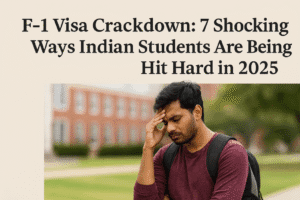F-1 Visa Crackdown: 7 Shocking Ways Indian Students Are Being Hit Hard in 2025
Indian students, constituting half of recent F-1 visa revocations, are grappling with abrupt terminations of their SEVIS records under heightened U.S. immigration enforcement. Over 1,500 international students—many from India—have faced sudden status cancellations since early 2025, risking deportation and academic disruption. The Indian government has mobilized consular support, with embassies assisting affected students while advocating for fair treatment.
Legal challenges, including a Michigan lawsuit involving an Indian national, argue revocation processes lack transparency and due process. U.S. universities, alarmed by the trend, are providing legal aid amid concerns over declining international enrollments, which contribute $40 billion annually to the economy. Critics warn the crackdown could drive students to alternatives like Canada or Europe, undermining America’s reputation as a global education hub. Advocates stress the need for balanced policies to protect both security interests and the nation’s academic appeal.

F-1 Visa Crackdown: 7 Shocking Ways Indian Students Are Being Hit Hard in 2025
The U.S. has long been a top destination for international students, with Indian scholars forming the second-largest cohort. However, recent enforcement actions by the Department of State (DoS) and Immigration and Customs Enforcement (ICE) have disproportionately impacted Indian students, sparking concerns over fairness, due process, and the broader implications for U.S.-India educational ties.
Understanding the Crackdown
Over 1,500 international students, including a significant number of Indians, have faced abrupt visa revocations and terminations of their SEVIS (Student and Exchange Visitor Information System) records since early 2025. These actions, part of a broader immigration enforcement push, leave students vulnerable to deportation and academic disruption. Notably, 50% of affected students in a sampled AILA report were Indian, reflecting their substantial presence in U.S. universities.
Why Indian Students?
India’s large share of STEM (science, technology, engineering, and math) students—often seeking Optional Practical Training (OPT) or H-1B visas post-graduation—may make them more visible targets in policies aimed at curbing immigration. Additionally, heightened scrutiny under recent administrations has led to stricter adjudication of visa renewals and status maintenance.
The Human Impact
Termination of SEVIS records—a system tracking enrollment and compliance—effectively invalidates a student’s legal status overnight. Consequences extend beyond deportation risks:
- Academic Derailment: Mid-semester terminations force students to abandon degrees, research, and funding.
- Financial Losses: Students lose tuition investments and face penalties for abruptly terminated leases or loans.
- Mental Health Strain: Uncertainty and stigma compound stress, with some students fearing reputational harm in their communities.
A lawsuit filed by four Michigan students, including an Indian national, highlights these struggles. Their case argues that ICE’s opaque revocation process violates procedural rights, leaving students without clear avenues to appeal.
India’s Response: Diplomacy in Action
The Indian Ministry of External Affairs (MEA) has mobilized its U.S. missions to assist affected students, offering:
- Consular Support: Guidance on legal resources and communication with U.S. authorities.
- Advocacy: Engaging with U.S. policymakers to address systemic issues impacting Indian nationals.
- Awareness Campaigns: Advising students to maintain meticulous enrollment and financial records to preempt compliance disputes.
MEA spokesperson Randhir Jaiswal emphasized, “Our embassies are committed to safeguarding the interests of Indian students, ensuring they receive fair treatment.”
Universities and Legal Pushback
U.S. institutions, reliant on international tuition, are increasingly alarmed. Over 240 colleges reported SEVIS terminations, with many providing legal aid to students. The lawsuits mirror 2020 efforts when universities successfully challenged Trump-era rules barring online study for international students.
AILA and advocacy groups argue that the crackdown contradicts America’s ethos as a hub for global talent, particularly in critical fields like AI and healthcare. “Revoking status without transparency undermines trust in the U.S. education system,” notes an AILA representative.
Navigating the System: Advice for Students
- Document Everything: Keep records of enrollment, attendance, and financial transactions.
- Seek Counsel: Contact university international offices and immigration attorneys immediately if notified by ICE.
- Leverage Community Support: Groups like SAINA (South Asian Immigration & Legal Services) offer pro bono aid.
- Stay Informed: Monitor policy shifts via trusted sources like the MEA or AILA.
Broader Implications
This crackdown risks accelerating a decline in international enrollments, which contribute $40 billion annually to the U.S. economy. For India, it may redirect students to alternatives in Canada, Australia, or Europe, reshaping global education dynamics.
As legal battles unfold, the situation underscores a pressing need for balanced policies that uphold security without sacrificing America’s academic appeal. For now, affected students and advocates continue fighting for clarity, fairness, and the chance to complete their American dreams.
You must be logged in to post a comment.